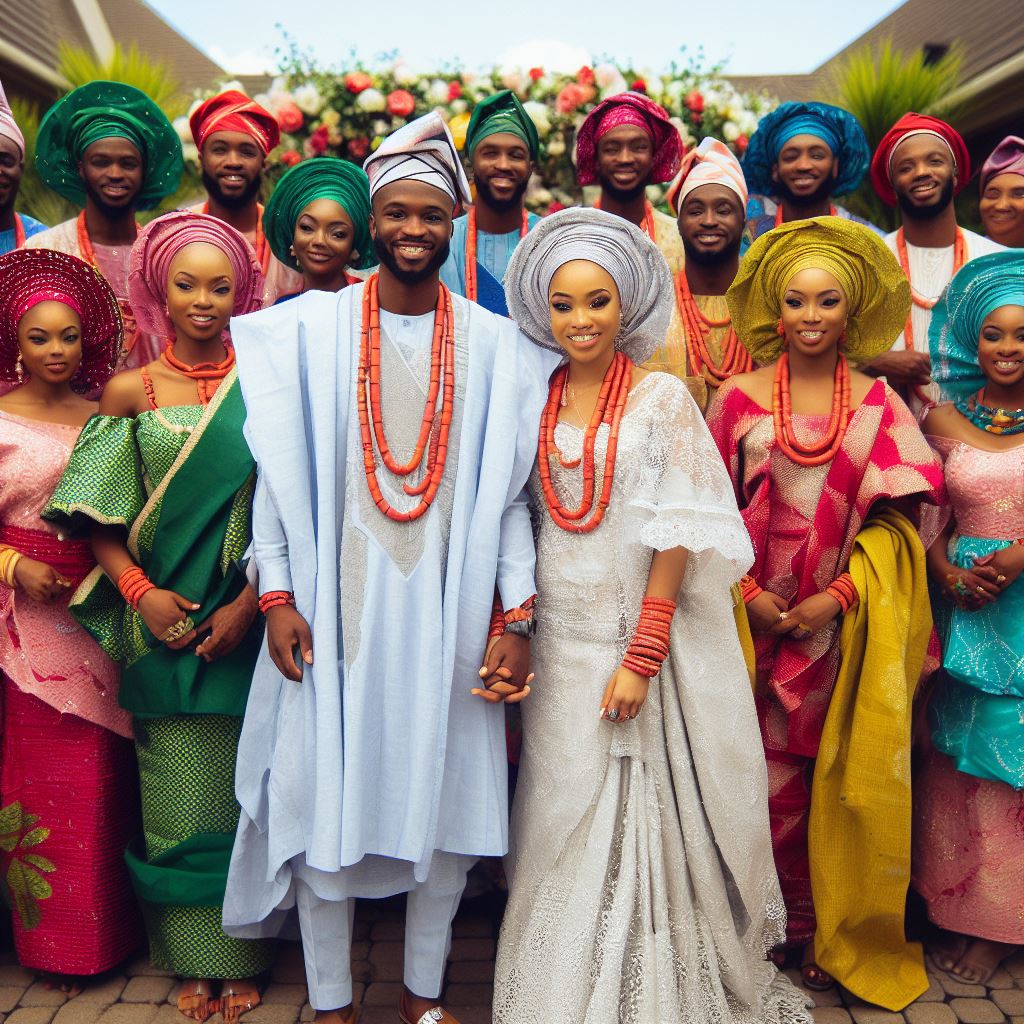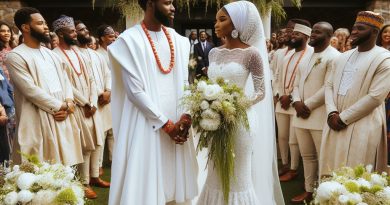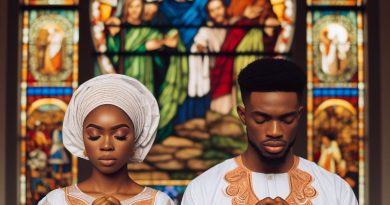Love in Literature: Nigerian Writers on Matrimony
Last Updated on January 28, 2024
Introduction
Unveiling Love in Nigerian Literature
Nigerian literature is a treasure trove of stories that unravel the multifaceted aspects of love and matrimony.
Nigerian writers, through their rich storytelling, have masterfully explored the themes of love and marriage, crafting narratives that resonate deeply with readers.
These authors offer a unique perspective that weaves together cultural nuances, societal norms, and personal emotions, creating a tapestry of love and commitment that is both distinct and universal.
The pages of their novels, short stories, and poems breathe life into characters who grapple with the challenges and joys of romantic relationships.
These literary works reflect the diverse nature of love, encompassing both the traditional and the contemporary, and highlighting the evolving dynamics of matrimony in Nigerian society.
In this section, we will delve into the literary landscapes crafted by Nigerian authors.
They offer profound insights into love and matrimony, enriching our understanding of human connections and relationships.
Love and Marriage in Nigerian Literature
The significance of love and marriage in Nigerian society
- Love and marriage hold great importance in Nigerian society, shaping the lives of individuals.
- Marriage is seen as a societal institution, strengthening family ties and preserving cultural traditions.
- Love is considered essential in a successful marriage, as it fosters understanding and companionship.
- In Nigerian culture, marriage is often seen as a way to secure social status and economic stability.
- The concept of love in Nigerian society reaches beyond romantic love and includes familial and communal love.
- Love and marriage are viewed as transformative experiences, leading to personal growth and fulfillment.
- Nigerian society places a high value on marriage, often expecting individuals to marry and start families at a certain age.
- Marriage is seen as a way to maintain social order and stability, as it provides a framework for the upbringing of children.
- Love and marriage are deeply intertwined with religious beliefs and customs in Nigerian society.
Overview of the portrayal of love and marriage in Nigerian literature
- Nigerian literature offers rich insights into the complexities and dynamics of love and marriage.
- Nigerian writers explore various themes related to love and marriage, such as love triangles and societal expectations.
- In Nigerian literature, love and marriage often serve as a means to explore larger societal issues and cultural norms.
- Nigerian authors often highlight the challenges faced by individuals in navigating love and marriage in a rapidly changing society.
- The portrayal of marriage in Nigerian literature reflects the evolving roles and expectations of women in Nigerian society.
- Love and marriage are depicted as both sources of joy and sources of conflict in Nigerian literary works.
- Nigerian writers weave traditional beliefs and customs surrounding love and marriage into their narratives.
- The depiction of love and marriage in Nigerian literature showcases the diversity of experiences within Nigerian society.
- Through their writing, Nigerian authors challenge traditional views and expectations surrounding love and marriage.
- Nigerian literature explores the complexities of love and marriage, questioning the societal norms and expectations that surround them.
- Love in Nigerian literature often transcends cultural and societal boundaries, emphasizing the universality of human emotions.
- Nigerian literature provides a platform for diverse voices and perspectives on love and marriage, enriching the literary landscape.
Love and marriage hold immense significance in Nigerian society, shaping interpersonal relationships and societal structures.
Nigerian literature delves into the complexities of love and marriage, offering a nuanced and diverse exploration of these themes.
From traditional beliefs and customs to the challenges faced by individuals in navigating modern relationships,
Nigerian authors capture the intricacies of love and marriage in their works, reflecting the evolving nature of Nigerian society.
Read: Validating Foreign Marriage Certificates in Nigeria
Chinua Achebe’s Perspective on Love and Matrimony
Analysis of Achebe’s novel “Things Fall Apart”
Arranged marriages, a common practice in Nigerian culture, play a significant role in Achebe’s novel.
Achebe vividly depicts the traditional process of matchmaking, emphasizing the importance of familial and communal involvement in the selection of partners.
Through characters like Okonkwo and his wives, Achebe demonstrates the complex dynamics within arranged marriages.
Okonkwo’s first wife, for example, represents the traditional expectations placed on women in Nigerian society.
She is expected to be submissive and fulfill her duties as a wife and mother. However, Achebe also presents the challenges faced by couples within arranged marriages.
The lack of emotional compatibility and strongly defined gender roles can lead to strained relationships and personal distress.
Furthermore, external influences further complicate matters for couples in “Things Fall Apart.” The arrival of European colonizers disrupts the existing cultural norms and traditions.
With the introduction of Christianity, notions of love and marriage are subtly questioned and challenged within the Nigerian community.
Achebe explores the clash between traditional Nigerian values and the influence of Western culture, shedding light on the tensions between the two.
Examination of Achebe’s views on love and marriage in Nigerian culture
Achebe’s depiction of love and marriage in Nigerian culture goes beyond the superficial.
He delves into the complexities of relationships, highlighting the importance of community involvement and individual agency.
Achebe challenges the notion that love is solely based on romantic feelings, emphasizing the roles of duty, responsibility, and sacrifice within a marital bond.
By examining Achebe’s views on love and marriage in “Things Fall Apart,” readers gain valuable insights into Nigerian culture and the intricacies of human relationships.
Achebe’s nuanced portrayal encourages readers to question their own preconceptions and recognize the diversity of experiences and perspectives within the realm of love and matrimony.
Chinua Achebe’s novel “Things Fall Apart” offers a compelling perspective on love and matrimony in Nigerian literature.
Through the representation of arranged marriages and the exploration of cultural dynamics, Achebe invites readers to reflect on the complexities of relationships within Nigerian society.
By analyzing Achebe’s views on love and marriage, readers can gain a deeper understanding of the cultural values and challenges faced by individuals in Nigerian culture.
Read: Solomon’s Song: Exploring Love and Passion in Scripture
Learn More: Intercultural Marriages and the Nigerian Legal Framework
Chimamanda Ngozi Adichie’s Exploration of Love and Marriage
Examination of Adichie’s novel “Americanah”
- Adichie portrays the challenges and complexities of long-distance relationships in “Americanah”.
- The story highlights the struggles faced by couples separated by geographical boundaries, emphasizing the power of love.
- Through the characters of Ifemelu and Obinze, Adichie explores the strength of love in overcoming obstacles and maintaining connections.
- Their unwavering commitment to each other despite distance demonstrates the resilience of their love.
- Adichie’s depiction sheds light on the sacrifices individuals make when love is at the core of their relationship.
- The long-distance narrative captures the yearning, longing, and challenges faced by couples in similar situations.
- Adichie’s vivid portrayal of the characters’ emotions demonstrates the depth of their love and the impact of separation.
- Despite the physical distance, Ifemelu and Obinze’s love remains steadfast, defying societal expectations.
- Adichie challenges the notion that physical presence is a prerequisite for a successful and fulfilling marriage.
- She highlights the importance of emotional connection and shared values as the pillars of a strong relationship.
Discussion of Adichie’s perspective on love and marriage in modern Nigeria
- Adichie’s exploration of love and marriage in modern Nigeria critiques societal expectations and gender roles.
- She challenges the traditional norms that restrict women and confine them to predefined gender roles.
- Adichie sheds light on the limitations imposed on women by a patriarchal society.
- Her writing empowers women to question these expectations and forge their own paths in love and marriage.
- She advocates for equality and highlights the importance of mutual respect and shared responsibilities in relationships.
- Adichie’s perspective promotes the idea that love and marriage should be based on partnership and mutual growth.
- She questions the prevailing notion that marriage is the ultimate goal for women, encouraging them to prioritize personal fulfillment.
- Adichie’s feminist standpoint challenges the existing power dynamics within relationships and calls for change.
- She advocates for conversations about love and marriage that are inclusive and considerate of everyone’s desires and aspirations.
- Adichie presents a refreshing perspective on love and marriage, urging individuals to break free from societal constraints and embrace their authentic selves.
In her exploration of love and marriage, Chimamanda Ngozi Adichie brings a fresh perspective that challenges societal norms and traditional gender roles.
Through her novel “Americanah”, she portrays the complexities of long-distance relationships, highlighting the power of love to overcome geographical boundaries.
Adichie’s depiction of Ifemelu and Obinze’s unwavering commitment showcases the strength and resilience of their connection.
The novel sheds light on the sacrifices individuals make for love, challenging the notion that physical presence is essential for a successful marriage.
Read: Understanding Divorce and Reconciliation: Scriptural Views

Tolu Akinyemi’s Poetic Reflections on Love and Matrimony
Analysis of Akinyemi’s poetry collection “Dead Lions Don’t Roar”
- Poems exploring the challenges and triumphs of love
- Reflections on the institution of marriage in Nigeria
Tolu Akinyemi, a Nigerian writer and poet, presents a unique perspective on love and matrimony in his poetry collection titled “Dead Lions Don’t Roar.”
Through his profound and thought-provoking verses, Akinyemi delves into the complexities of relationships, offering both insightful observations and emotional reflections.
The collection “Dead Lions Don’t Roar” comprises poems that are deeply rooted in the human experience of love.
Akinyemi skillfully navigates through the challenges, triumphs, and nuances of romantic relationships. In each carefully crafted verse, he brings to life the spectrum of emotions that love evokes.
Insights into Akinyemi’s poetic representation of love and matrimony
Akinyemi’s exploration of love goes beyond the conventional notions often portrayed in literature. His poetry captures the everyday struggles faced by individuals in maintaining and nurturing relationships.
Through his words, he delves into the intricate layers of emotions and the conflicts that arise within love. The raw and honest representation of these challenges provides readers with a genuine and relatable portrayal.
Furthermore, Akinyemi’s poetry collection delves into the institution of marriage in Nigeria.
He sheds light on the societal expectations, traditions, and cultural dynamics that influence the lives of couples within the Nigerian context.
Through his verses, he raises questions about the role of marriage in a changing society and its impact on individual identities.
With an exquisite blend of vivid imagery and lyrical language, Akinyemi explores the multi-faceted nature of love and the joys and sorrows that accompany matrimony.
His poems embody a deep understanding of human emotions, presenting the reader with a nuanced portrayal of love that transcends cultural boundaries.
Beyond the thematic exploration, Akinyemi’s distinctive poetic style sets his work apart.
His use of metaphors and wordplay adds depth to his verses, allowing readers to engage with the layers of meaning embedded within.
Each line resonates with his impeccable command over the English language, captivating the reader’s imagination.
Akinyemi’s poetic representations of love and matrimony invite readers to reflect on their own experiences, evoking a range of emotions.
His words prompt introspection, encouraging readers to evaluate the complexities of their own relationships and understand the universal struggles faced by couples.
Read: Harmonizing Love and Faith: Nigerian Couple’s Anniversary Prayer Rituals
Conclusion
A recap of the main points discussed in this section reveals the powerful perspective of Nigerian writers on love and matrimony in literature.
Their unique insights shed light on the complexities and nuances of this universal theme.
What makes the perspectives of Nigerian writers especially significant is their ability to incorporate cultural, societal, and historical contexts into their portrayals.
These writers provide a rich tapestry of experiences and emotions, offering readers a deeper understanding of love and marriage.
The enduring themes of love and marriage in Nigerian society are beautifully portrayed by these writers.
Their works reflect the diversity and complexities of relationships, highlighting the challenges, triumphs, and tensions experienced by individuals in the context of matrimony.
By exploring the multifaceted nature of love and matrimony, these Nigerian writers have contributed immensely to the world of literature.
Their narratives promote empathy, foster cultural appreciation, and inspire readers to reflect on their own experiences with love and marriage.
Through their powerful storytelling, Nigerian writers remind us of the universality of love and the profound impact it has on individuals and societies across the globe.


